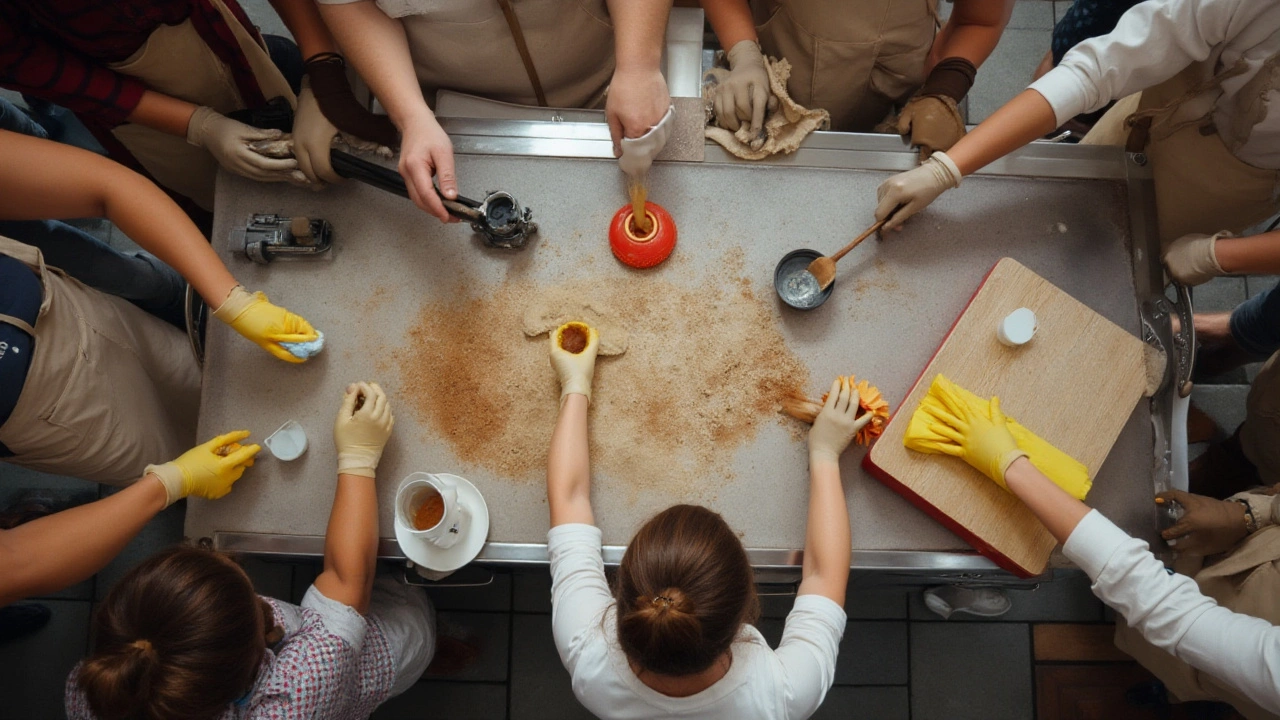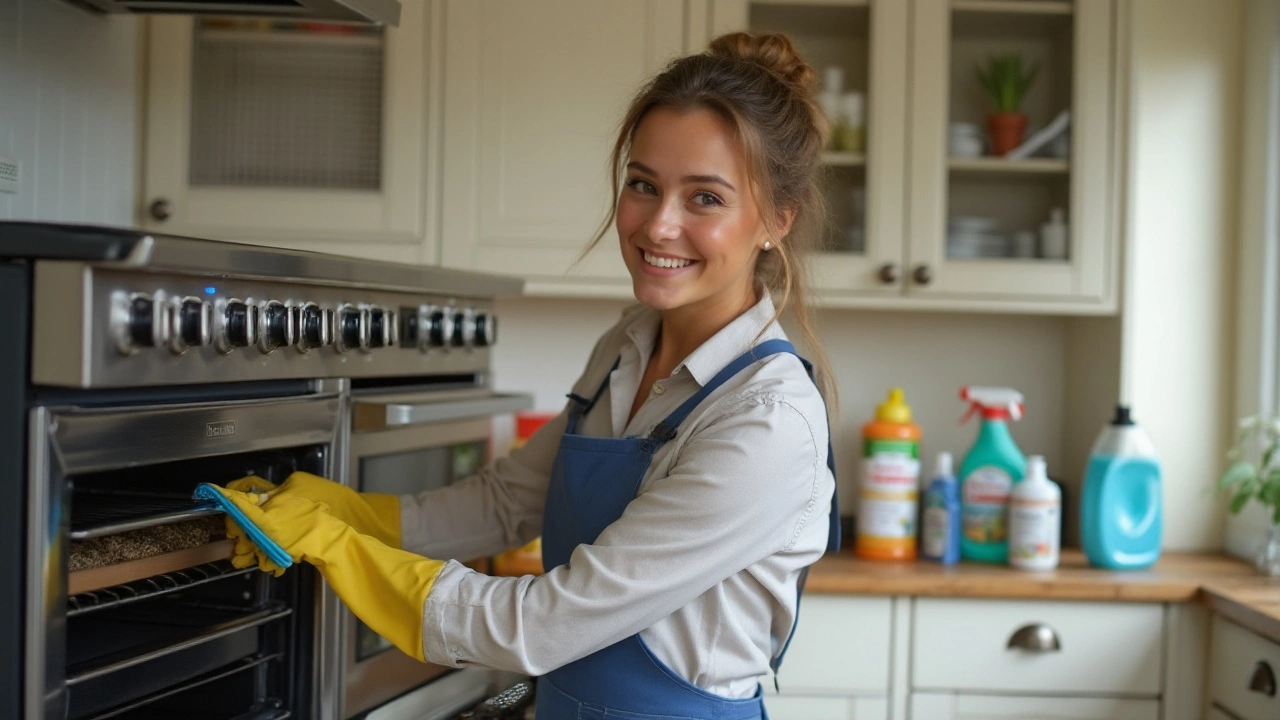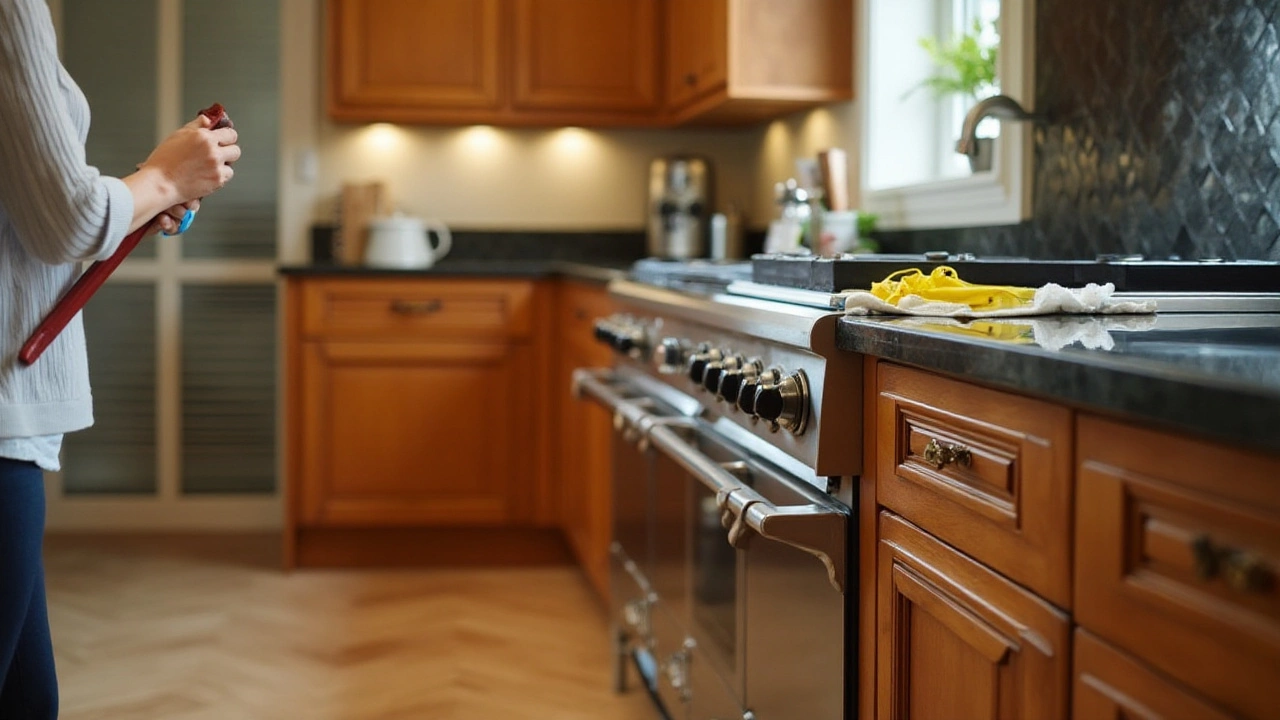Cleaning a kitchen is more than just a necessary household chore; it's an art form, requiring the right techniques and tools to achieve that gleaming finish. But, it's easy to fall into traps while doing this seemingly simple task.
Whether it's dousing countertops with the wrong cleaner or stacking dishes in ways that make your dishwasher cringe, we're all guilty of a few missteps here and there. The aim here is to explore some common blunders we might make and how to sidestep these pitfalls, keeping the heart of your home not only clean but also a joyful space to cook and gather.
In this guide, let's roll up our sleeves and delve into key mistakes to avoid, along with some handy tips to leave your kitchen spotless and functional.
- Overloading the Dishwasher
- Using the Wrong Cleaning Products
- Neglecting Small Appliances
- Ignoring Proper Ventilation
Overloading the Dishwasher
You might think that cramming as many dishes as possible into your dishwasher will save time and energy, but this small misjudgment could cost you more than you save. Overloading the machine can lead to dishes coming out not fully clean, forcing you to rewash them manually. This not only wastes water, but it also increases your household's overall energy consumption. Dishwashers are designed to ensure each dish receives a certain degree of water pressure and detergent exposure, both essential for a thorough clean. By blocking the water and detergent flow, overloaded dishes resist the dishwasher's efforts to cleanse them properly.
Each dishwasher comes with a design that optimizes the cleaning process, and it's crucial to follow the manufacturer's guidelines. Usually, this means leaving spaces between each dish, allowing water and detergent to circulate freely. When dishes are packed into the racks with no room to breathe, they end up clashing together or blocking the nozzles that supply water, making the whole cleaning cycle less effective. Consider the long-term ramifications: consistently overloaded dishwashers can lead to wear and tear on the machine itself. Components made to last years could fail prematurely because they're working harder than intended.
Many might believe that they are saving the planet by cramming more into each load; however, the opposite is often true. When your dishwasher is constantly overloaded and underperforming, it creates more work for itself and more stress on the environment. A poorly functioning dishwasher might not use less water or energy compared to running a second, properly loaded cycle. As someone might wisely put it, "Quality trumps quantity every time, especially when efficiency is at stake."
According to Consumer Reports, dishwashers are nearly three times as efficient as handwashing, but only when used properly, which means avoiding the temptation to overfill.
Add to this the very real financial implications regarding appliance longevity and utility bills. While it seems like a minor issue, continuing to overload your dishwasher not only potentially increases the time you spend washing dishes but could also contribute to gradual but steady increases in your energy bills. Simple changes, like adjusting your loading habits, can extend the life of your appliance, as well as keep those monthly costs in check.
Next time, when you find yourself balancing precarious towers of dinnerware, consider breaking the cycle and loading the dishwasher with care. This practice isn't merely about adhering to the instructions or maintaining a sense of order. It's grounded in the notion that maintaining the most efficient function of your household appliances keeps both your kitchen and eco-footprint more refined. So next time, heed these insights and let your dishwasher glide with ease, ensuring a sparkling finish every time.

Using the Wrong Cleaning Products
Diving into kitchen cleaning with vigor is all well and good, but imagine this: you're all set to tackle that greasy stovetop and reach under the sink for your trusty spray bottle, only to realize you might be using the wrong cleaner. Using inappropriate cleaning products is a common blunder in the world of housekeeping. It's essential to match the product to the surface type, as some detergents and chemicals can cause more harm than good. For instance, using bleach on stainless steel can lead to corrosion and damage its protective layer. Similarly, a glass cleaner might leave streaks on a wooden countertop, spoiling the aesthetic of your gleaming kitchen. Identifying the right cleaning product isn't just about efficiency; it's about preserving the longevity of your kitchen's surfaces.
Let's delve deeper into some specifics. When it comes to countertops made of granite or marble, you might think any household cleaner will do, but that's a mistake to avoid. Strong acids or alkaline solutions can dull and etch these beautiful stones, necessitating costly replacements. Instead, opt for pH-balanced cleaners specifically designed for stone surfaces. This simple switch ensures your natural stone surfaces maintain their impeccable beauty for years to come.
Ingredients Matter
The list of ingredients on a cleaning product often reads like a complex chemistry textbook, yet it's crucial to understand what you're using. For example, ammonia is effective but can become harmful when mixed with other chemicals like bleach, creating toxic fumes. Opt for products labeled as non-toxic, particularly in spaces like the kitchen where food preparation occurs. A growing body of research advocates for the use of natural cleaning solutions made from simple ingredients like vinegar and baking soda. Not only do these alternatives clean effectively, but they also minimize the risk of allergic reactions and respiratory problems, making them family-friendly options.
"Choosing the right cleaning product is as important as the cleaning itself," explains Sophie Hinchcliffe, a renowned cleaning expert.
| Cleaning Product | Recommended Use | Precaution |
|---|---|---|
| Bleach | Disinfecting plastic surfaces | Avoid metal surfaces |
| Ammonia | Glass cleaning | Do not mix with bleach |
| Vinegar | Deodorizing and cleaning | Not ideal for granite |
Eco-Friendly Alternatives
In today's age of environmental awareness, eco-friendly cleaning products have taken center stage. Using these sustainable options not only keeps your kitchen cleaning routine effective but also reduces your carbon footprint. Brands like Method and Ecover offer a range of environmentally safe products that don't compromise cleaning power. These alternatives are free from harsh chemicals and come in biodegradable packaging, ticking all the boxes for the conscious consumer. By integrating these into your cleaning regimen, you contribute to a healthier home and planet simultaneously.

Neglecting Small Appliances
In any kitchen, small appliances often play a major role in our daily routines. From the trusty toaster shimmering on your countertop to the food processor helping you chop vegetables, these devices are our silent partners in culinary adventures. Yet, despite their importance, they are frequently bypassed during cleaning sessions. It's crucial to recognize that kitchen cleaning includes these mini-marvels, which if neglected, can harbor bacteria and decrease in efficiency. Ensuring these appliances don't turn into forgotten corners of your kitchen is a step in the right direction.
Take, for instance, the humble toaster. It's a staple in most households, delivering crispy, warm bread at the touch of a button. But, have you ever noticed the accumulation of crumbs at its base? These not only attract unwanted pests but can also become a fire hazard if not cleared regularly. A simple habit of frequently emptying the crumb tray and giving the toaster a gentle shake to dislodge hidden crumbs can keep it functioning safely and effectively. It's simple actions like this that ensure your household chores do not become cumbersome in the future.
Small appliances like blenders and food processors demand a bit more attention. After all, they frequently handle an array of ingredients, and residue left unchecked can solidify, making future cleanups more challenging. Disassembling these devices after every use and giving each part a thorough wash is a practical approach. Remember to air-dry them completely before reassembly to prevent any moisture buildup, which can lead to mold. Not only does this ensure cleanliness, but it also prolongs the life of these hardworking machines.
Don't forget specialty appliances like coffee makers, which are often guilty of harboring hard water deposits and leftover coffee oils. Over time, these can affect the taste of your coffee and damage the machine. A monthly cycle of equal parts water and vinegar can decalcify these deposits, leaving your coffee maker in top shape. As per the home experts at Good Housekeeping, "Regular maintenance not only ensures better-tasting coffee but also enhances the machine's lifespan."
Even lesser-used appliances, like your electric kettle or stand mixer, deserve a bit of your attention. Decalcifying a kettle with vinegar or a commercial solution keeps it efficient. Meanwhile, wiping down a stand mixer and cleaning its attachments post-use ensures it's always ready for the next baking spree.
Cleaning mistakes often stem from underestimating the importance of these small players in the kitchen. By adopting these simple routines, you not only ensure a spotless kitchen but also increase the longevity and performance of your beloved appliances, making each cooking experience as delightful as the last. Never forget that a clean kitchen extends beyond the visible parts; the true shine is in the details.

Ignoring Proper Ventilation
In the pursuit of achieving a spotless kitchen, proper ventilation often slips off the list of priorities. Yet, neglecting this aspect can lead to a slew of problems, ranging from health concerns to the deterioration of your kitchen environment. Ventilation is not just about reducing cooking odors; it's crucial for maintaining a healthy space. Cooking generates grease, smoke, and moisture, all of which need an escape route to prevent accumulating and causing damage. Without adequate ventilation, these particles can leave deposits on your walls and ceilings, creating a cleaning nightmare over time.
Think about the last time you cooked a heady garlic-based dish or a spicy curry. The aroma lingers, right? Without proper ventilation, these smells can seep into fabrics, leaving persistent odors. Additionally, the accumulation of grease particles can result in sticky surfaces throughout the kitchen, necessitating more frequent cleaning sessions. Thus, investing a little time and effort into ensuring your kitchen has the right airflow is not just wise; it's essential. When cooking, always kick on the exhaust fan, or if you don't have one, crack open windows to allow fresh air to circulate and push out unwanted elements.
Moreover, high humidity levels in a kitchen can expedite the growth of mold and mildew, turning a happy place into a breeding ground for various allergens. Installing a range hood can help combat this issue by extracting heat and moisture effectively. According to a study conducted by Harvard, good indoor air quality prevents respiratory diseases and improves the overall living environment quality.
The Environmental Protection Agency (EPA) emphasizes, "Proper ventilation is a simple and effective tool for mitigating indoor pollution and maintaining good air quality."Understanding the importance of ventilation may save you from hassles in the future, as adequate air circulation aids in preserving both the condition of your kitchen and the health of its users.
If you're still contemplating installing proper ventilation, consider its role in energy conservation as well. Using natural ventilation methods like windows, vents, and fans can decrease reliance on air conditioning systems during hot months, leading to lower energy bills. Existing data highlight that homes equipped with efficient ventilation systems can reduce cooling loads by up to 70%, as stated in a report by the International Energy Agency. A small change in your kitchen cleaning routine might lead to significant savings and longer-lasting freshness.
